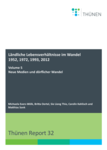Changing rural living conditions 1952, 1972, 1993, 2012
Abstract
New media is changing life in cities and villages alike. Farmers, for example, use the internet to order goods or obtain information on agricultural topics. Combine harvesters are navigated by satellite, and the evaluation of soil data, rainfall and photos (via satellite or antenna) is increasingly used to automatically control and optimise the use of agricultural land. However, the leisure and shopping habits of the rural population are also changing: the purchase of new furniture, technical equipment or higher-quality clothing is often researched in advance on price-comparison online portals, after which the rural population usually orders the cheapest offer via the internet. Online shopping is even more important in peripheral rural areas than in cities. One example: While young parents in the city can quickly buy a pack of nappies from a drugstore on the go, toddler parents in peripheral areas often cannot find a drugstore within a radius of 30 kilometres. This is where the Internet proves to be a great help when purchasing everyday products. The guiding principle of creating equal living conditions (Article 72, Paragraph 2 of the Basic Law) is closely linked to infrastructure. This includes "ensuring a nationwide, similar basic supply of communications services (universal services) in urban and rural areas at affordable prices" (Deutscher Bundestag, 2011) as the basis for the use of new media in business and society. [...]
Authors
Evers-Wölk, Michaela; Oertel, Britta; Thio, Sie Liong; Kahlisch, Carolin; Sonk, MatthiasFields of research
Health and well-being, Communication and publicity, Technology Assessment and Participation

Source information
Title
Changing rural living conditions 1952, 1972, 1993, 2012
Volume 5: New Media and Village Change
Thünen Report Volume 32
Year of publication
2015
Document type
Book Monograph